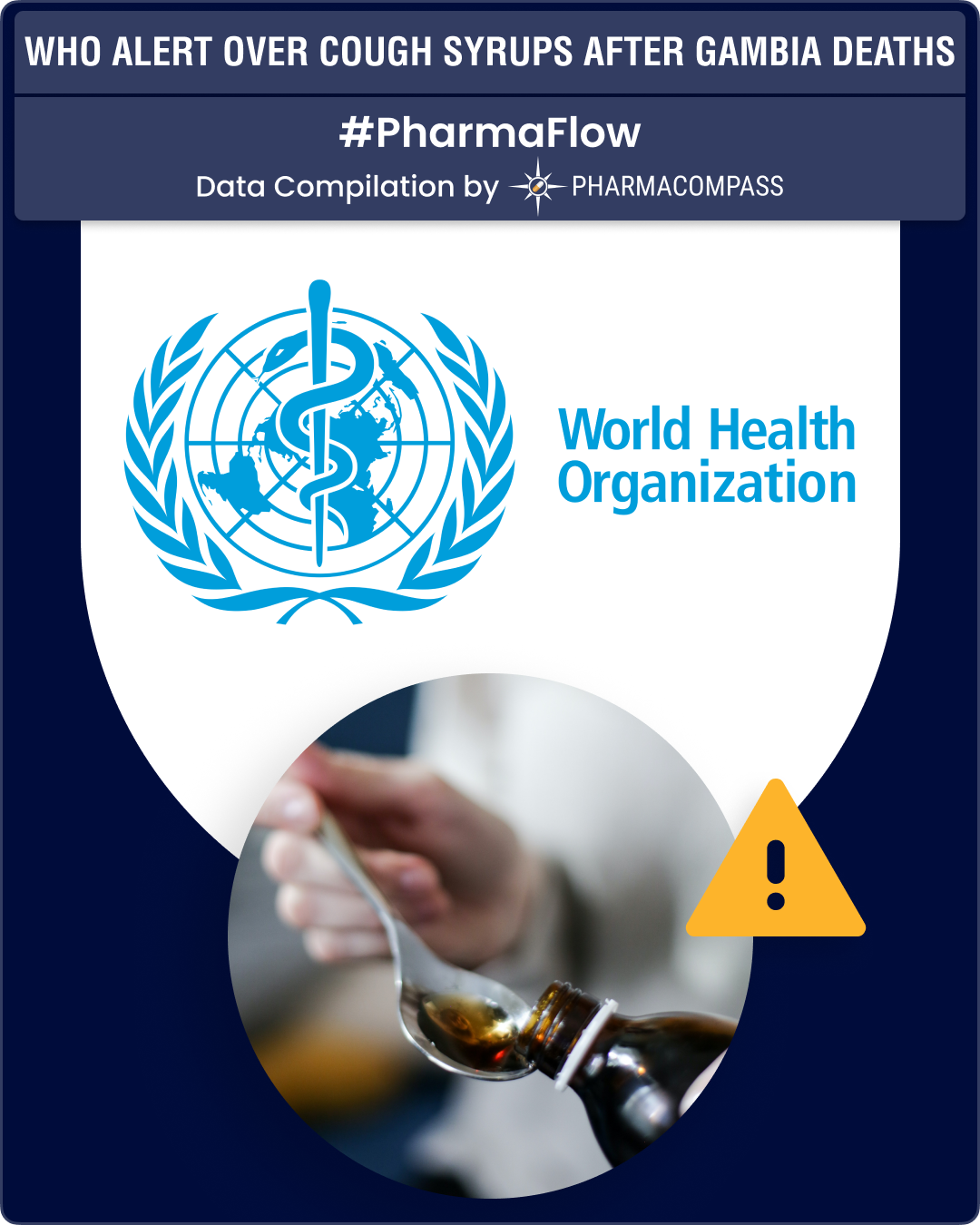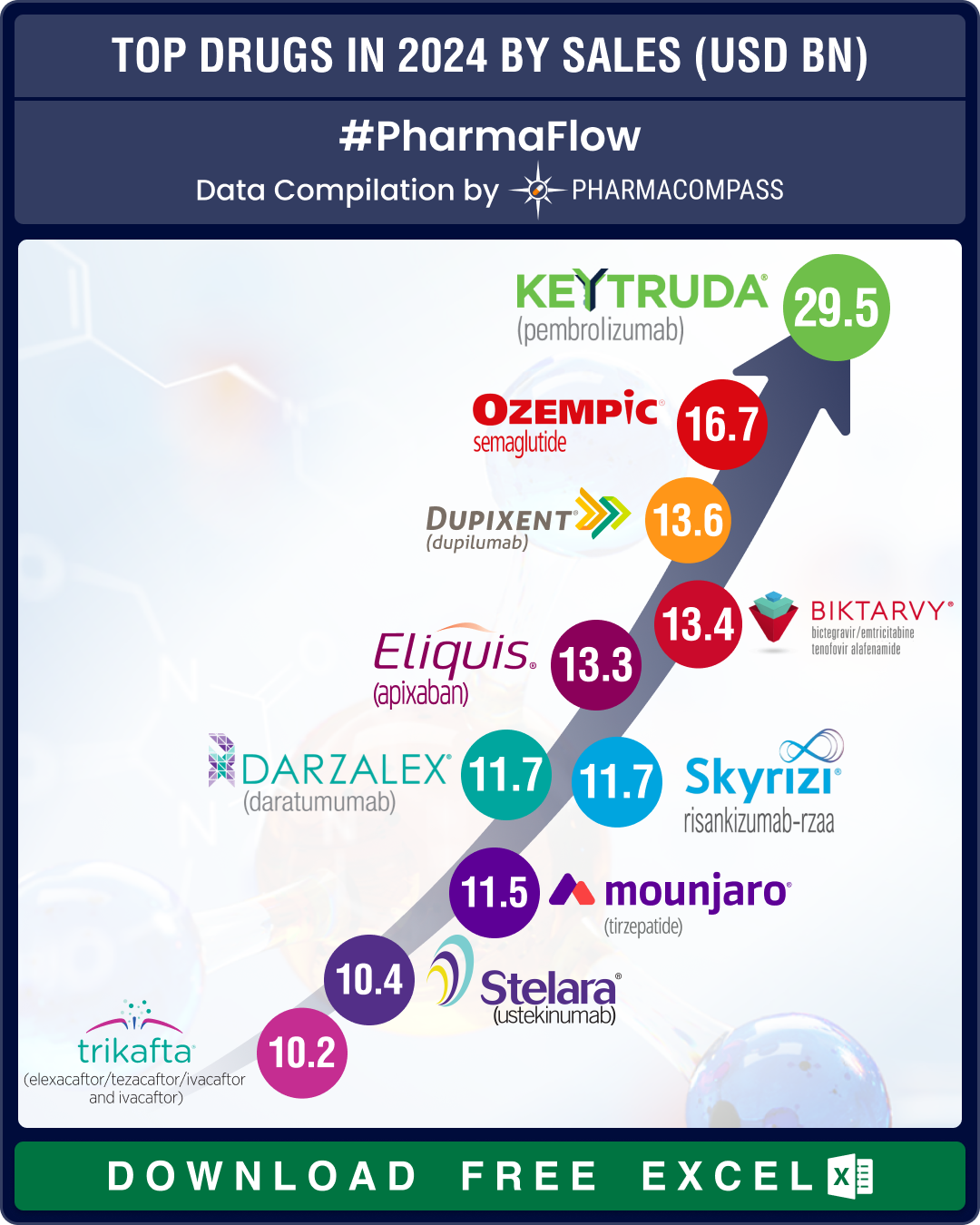
By PharmaCompass
2022-10-12
Impressions: 3238
News about contamination of cough syrups manufactured by Indian drugmaker Maiden Pharmaceuticals has shaken the global drug industry. According to the statement issued by the World Health Organization (WHO) last week, contaminated cough and cold syrups manufactured by Maiden may have caused the deaths of 66 children from acute kidney injuries in The Gambia. Since then, the number of child deaths has been raised to 69.The WHO linked the deaths to four syrups — Promethazine Oral Solution, Kofexmalin Baby Cough Syrup, Makoff Baby Cough Syrup, and Magrip N Cold Syrup — manufactured by Haryana-based Maiden after lab analysis revealed “unacceptable” levels of diethylene glycol (DEG) and ethylene glycol (EG). Both these organic compounds are toxic and can cause acute kidney injury.
The UN agency said the syrups may have been distributed outside The Gambia and has issued an alert advising people and regulatory agencies to stop their consumption.
India’s health ministry has said Maiden had the license to only export the four drugs in The Gambia. These syrups are not being sold in India.
While reports of drug contamination are not new, the loss of so many young lives has raised several questions, and perhaps the most pertinent amongst them is the fallout of this incident on the global supply chains for pharmaceuticals.
DEG — the old devil
During the last two decades, we have witnessed several incidents of drug adulteration and contamination. The most widely reported scandal was the 2008 Chinese heparin adulteration incidents in the US that killed 81 people and left 785 severely injured. The more recent incidents are that of nitrosamine impurities – N-nitrosodimethylamine (NDMA) and N-nitrosodiethylamine (NDEA) — found in several blood pressure medications (collectively known as sartans). These impurities are probable human carcinogens. The same impurities were also found in ranitidine, nizatidine (both drugs are used to decrease the production of stomach acid) and metformin (used to treat type 2 diabetes). These impurities have led to several drug recalls across the world.
The deaths of Gambian children have been linked to both EG and DEG. EG is used for two purposes — as a raw material in the manufacture of polyester fibers and for antifreeze formulations. Though widely used as a solvent, DEG has adverse effects on humans, and has been banned in many countries across the world. And when used beyond a miniscule limit, both DEG and EG can cause symptoms such as acute kidney failure and may be fatal, especially for kids.
Incidents of DEG contamination are not new. There have been reports of DEG contamination from China, Panama (2006 and 2007) and Nigeria (2008-09). In Panama, toothpastes imported from China were found to be contaminated with DEG. And in 2007, drugmakers were found to be selling toxic cough syrup laced with DEG in Panama.
In 2009, 84 Nigerian children reportedly died after being given “My Pikin”, a teething syrup contaminated with DEG. In 2020, Indian drugmaker Digital Vision had come under the scanner for its cough syrup (Cofset) that was adulterated with DEG. Earlier that year, around 12 children in a village near Jammu (north India) had died after consuming adulterated cough syrup (Coldbest) manufactured by the same company.
Maiden’s tainted track record
Maiden Pharmaceuticals started its operations in November 1990 and has presence in Asia, Africa, South America, Russia, Poland and Belarus. Its website says Maiden Pharmaceuticals is a WHO-GMP & ISO 9001-2015 certified pharmaceutical company. However, according to a report published in The Wire, a WHO spokesperson has clarified that the UN agency has neither inspected the company nor any of its products.
According to various news reports, Maiden has quite a tainted track record. The company has been blacklisted in Vietnam and many Indian states have flagged the poor quality of its drugs over the years.
The Indian government’s database points to several warnings issued by the state governments of Gujarat and Kerala on account of illegal practices of Maiden. Another Indian state, Bihar, blacklisted Maiden in 2011 for supplying ‘spurious’ and ‘substandard’ medicines in the state several times. It barred the company from taking part in the state’s tendering process for medicine supplies.
Meanwhile Naresh Kumar Goel, director and owner of Maiden Pharma has refuted all allegations. He has blamed the deaths on e-coli bacteria and paracetamol, which was supplied by some French company in The Gambia.
Indian authorities find major violations of GMPs
A statement issued by India’s ministry of health and family says any drug exported from India is tested by the recipient country. This implies that there were lapses even on part of the Gambian authorities.
India’s apex drug regulatory authority – the Central Drugs Standard Control Organisation (CDSCO) – had launched an investigation, along with the Food and Drug Administration of Haryana, after it received information about the deaths on September 29. According to news reports, these authorities have found major violations of good manufacturing practices (GMPs). During the investigation, the authorities found multiple lapses, including missing batch number, manufacturer name, manufacturing date and expiry date on the invoices of propylene glycol, which is used in cough syrups.The report by the CDSCO has been submitted to the Prime Minister’s Office, as also to the Union health ministry. The regulator and the state drug controller of Haryana have halted manufacturing activities at Maiden’s plant in Sonipat (Haryana) on grounds of deficiencies found in the local inspection.
Alongside, India’s health ministry has sent samples of all the four products exported to The Gambia for testing to the Regional Drug Testing Lab in Chandigarh. Results from that investigation are awaited. The health ministry has also asked the WHO to share its report on the “establishment of causal relation to death with the medical products in question.”
Meanwhile, trade body Pharmaceuticals Export Promotion Council of India (Pharmexcil) has suspended Maiden’s membership.
Our view
India’s Prime Minister Narendra Modi has often touted India as the “pharmacy to the world" and stressed that drugs made in the country have earned the world’s trust. While many view this episode as a massive blow to India’s image, we do not see this changing the country’s standing in the global pharmaceutical supply chain.
Despite the heparin scandal of 2009, China’s place in the world of pharmaceuticals has not diminished. China continues to be the global leader in the production and export of APIs. The country produces and exports around 40 percent of APIs sent out to the world.
India’s pharmaceutical exports have been growing at a healthy rate of 7 percent CAGR and have increased from US$ 17.3 billion in 2018 to US$ 24.6 billion in 2022. This episode is unlikely to change that growth story. However, the deaths of Gambian children must serve as a wake-up call to regulators across the world to get their act together. Erring drugmakers must not go scot-free.
The PharmaCompass Newsletter – Sign Up, Stay Ahead
Feedback, help us to improve. Click here
Image Credit : WHO alert over cough syrups after Gambia deaths by PharmaCompass license under CC BY 2.0
“ The article is based on the information available in public and which the author believes to be true. The author is not disseminating any information, which the author believes or knows, is confidential or in conflict with the privacy of any person. The views expressed or information supplied through this article is mere opinion and observation of the author. The author does not intend to defame, insult or, cause loss or damage to anyone, in any manner, through this article.”








